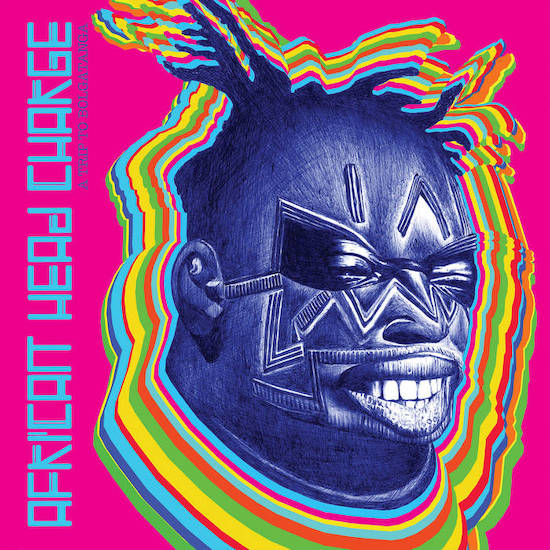Master percussionist Bonjo Iyabinghi Noah’s belief that “drums are medicine” remains at the core of African Head Charge’s transglobal psychedelic dub explorations. forty-two years have passed since the release of their debut My Life In A Hole In The Ground, which heralded the birth of tribal house, and later jungle and dub techno. The band’s cross-cultural impact can be felt throughout the UK bass music continuum, with contemporary artists like Al Wootton and Azu Tiwaline further expanding on Adrian Sherwood’s studio techniques and Noah’s percussive workouts. AHC could nowadays be considered a somewhat legacy project, their releases in the past twenty years few and far between. Their last original album was released in 2011, followed by two collections of outtakes and alternative dubs from the On-U Sound archives.
Compared to many predecessors which presented, in Sherwood’s words, “spaced out African dub”, A Trip To Bolgatanga is marked by a more specific geographical bent. The topical focus is Bolgatanga, the Ghanaian town where Noah’s resided since the early 90s, making it more autobiographical, less ‘anthropological’. Newly recorded vocals and instrumentals are used instead of the typical folk samples from Alan Lomax’s vaults, and the long list of collaborators features old friends like Skip McDonald, Doug Wimbish and Ghetto Priest, to name a few.
The album is characterised by Ghanaian drumming techniques from local traditions such as the Fante, the Akim, the Ga and the Bolgatanga, which Noah incorporated in his practice. The vocals and strumming of Ghana’s most recognised kologo (a traditional two-stringed lute) player King Ayisoba are also very prominent in some songs. Opener ‘A Bad Attitude’, with its encouraging lyrics and collective chants, resembles Ayisoba’s stripped-back jam ‘Grandfather Song’ from his 2017 Glitterbeat debut. Still, you immediately recognise AHC’s touch, with processed kologo riffs, Ayisoba’s echoey shouts and signature “blahs”, a sturdy bottom bassline and bouncy congas added to the mix.
Things take a different turn on every song, and the vibe shifts palpably, too, making the record a slow grower that gets more familiar with each rewind. The quasi-Balearic dancehall roller ‘Accra Electronica’ will hopefully find its way onto DJs’ USBs, just like the syncopated “tribal house” jam ‘Asalatua’, a kind of remake of their legendary track ‘Stebeni’s Theme’ from 1981 (or the early No Smoke releases for Warrior Dance). Noah’s nimble drumming again comes to the fore in ‘Microdosing’, a gorgeous synthesis of Sherwood’s overdubs and spiralling percussive dialogues. Things get more hallucinogenic in the low slung ‘Push Me Pull You’, with ominous horns, reeds and hypnotic calls-and-responses that’d fit perfectly in a new David Lynch production (just like their song ‘Far Away Chant’ suited the heart-pounding film Wild at Heart).
Their tender side is revealed in the synth-infused dreamscape of ‘I Chant Too’, as well as the title track, a masterclass of dub mellowness with bittersweet piano, saxophone and kologo melodies. ‘Passing Clouds’, remarkable for its brass lines, is the most traditionalist dub take on the record, while the most unexpected moment is found in the song ‘I’m A Winner’, whose juicy ska stroke-ups and subtle polyrhythms will make your feet itch. It’s the auto-tuned vocals, though, that really make it a modern AHC production. While A Trip To Bolgatanga can’t be considered an epochal release as some of their earlier outings, it provides a particularly transportative soundtrack for the coming scorching days.


